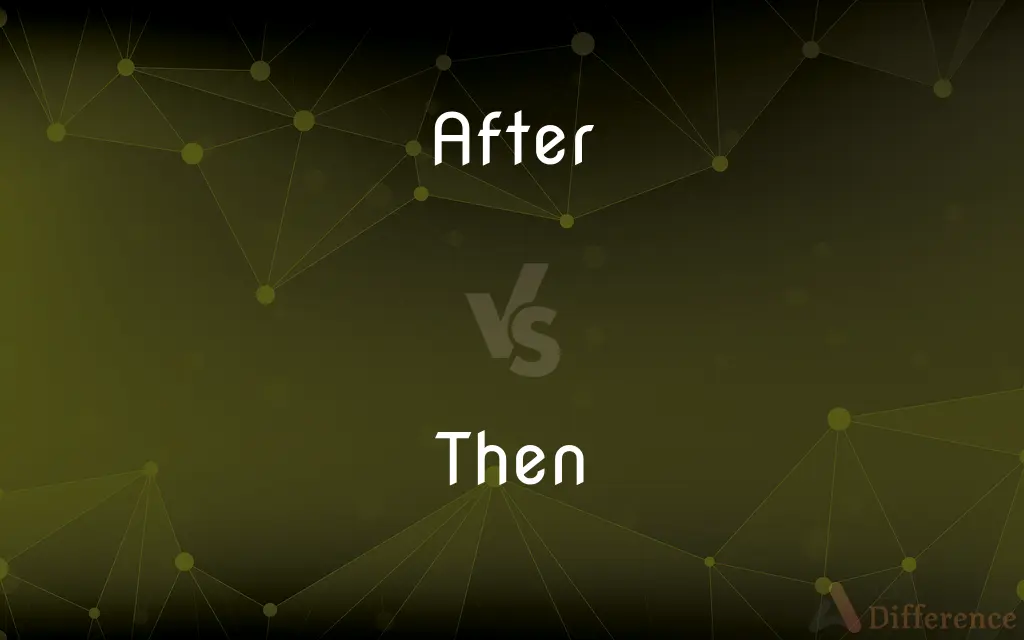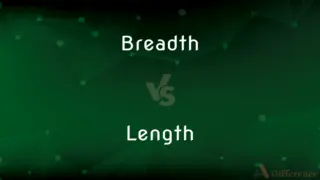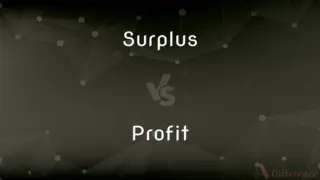After vs. Then — What's the Difference?
By Tayyaba Rehman & Urooj Arif — Updated on April 21, 2024
"After" is used to denote the sequence or consequence in time or order, while "then" suggests a sequence or what comes next in a series of events.

Difference Between After and Then
Table of Contents
ADVERTISEMENT
Key Differences
"After" is primarily used as a preposition or conjunction to indicate that something happens subsequent to a specific event or time, while "then" can serve as an adverb, conjunctive adverb, or noun, referring to a specific time or sequence.
"After" often sets the stage for a condition or circumstance that follows an event, whereas "then" is typically used to advance a narrative by denoting the next part of a sequence in storytelling or instructions.
In grammatical terms, "after" can link two clauses to create a dependent relationship, highlighting what follows an initial action or state, on the other hand, "then" provides a chronological cue in both spoken and written narratives, emphasizing a linear progression.
Usage of "after" might imply a relationship of causality or succession in more formal contexts, whereas "then" is versatile, appearing in informal dialogue and written lists or procedures to mark progression or steps.
When used in storytelling or recounting events, "after" suggests a more distant or delayed sequence, while "then" indicates immediate succession or next steps, making it more direct and immediate in conveying timelines.
ADVERTISEMENT
Comparison Chart
Part of Speech
Preposition, Conjunction
Adverb, Conjunctive adverb, Noun
Function
Indicates what happens following an event or time
Indicates the next part or a consequence in time
Usage in Sentences
Sets a condition or sequence post an event
Advances narrative or lists steps
Formality
Often found in more formal or literary contexts
Used both formally and informally
Example of Usage
"After the meeting, we went for lunch."
"We met at noon; then we went for lunch."
Compare with Definitions
After
In pursuit or search of.
Go after your dreams.
Then
Next in order of time.
We had tea, and then we talked.
After
As a preposition, indicates following in time.
After dinner, we watched a movie.
Then
In that case, therefore.
If you're tired, then take a break.
After
Concerning someone or something.
Ask after her health.
Then
As a noun, that time.
The then president initiated the policy.
After
As a conjunction, means subsequent to and because of.
After he left, she cleaned the house.
Then
At that time.
I lived in Berlin then.
After
Used to describe the pursuit of another.
She took after her mother in looks.
Then
In addition, besides.
It's cheap, then it's not durable.
After
In the time following (an event or another period of time)
After a while he returned
He'd gone out with his secretary for an after-work drink
Shortly after their marriage they moved to Colorado
Then
At that time; at the time in question
He accepted a peerage from the then Prime Minister, Edward Heath
Phoebe by then was exhausted
I was living in Cairo then
After
Behind
She went out, shutting the door after her
Then
After that; next; afterwards
She won the first and then the second game
After
In pursuit or quest of
Chasing after something you can't have
Then
In that case; therefore
If you do what I tell you, then there's nothing to worry about
Well, that's okay then
After
Next to and following in order or importance
In their order of priorities health comes after housing
Then
At that time
I was still in school then. Come at noon.
I'll be ready then.
After
In allusion to (someone or something with the same or a related name)
They named her Pauline, after Barbara's mother
Then
Next in time, space, or order; immediately afterward
Watched the late movie and then went to bed.
After
During the period of time following (an event)
Duke Frederick died soon after
Bath time ended in a flood after the taps were left running
Then
In addition; moreover; besides
It costs $20, and then there's the sales tax to pay.
After
During the period of time following (an event)
Duke Frederick died soon after
Bath time ended in a flood after the taps were left running
Then
Used after but to qualify or balance a preceding statement
The star was nervous, but then who isn't on the first night of a new play.
After
Later
He was sorry in after years
Then
In that case; accordingly
If traffic is heavy, then allow extra time.
After
Nearer the stern of a ship
The after cabin
Then
As a consequence; therefore
The case, then, is closed.
After
Behind in place or order
Z comes after Y in the alphabet.
Then
Usage Problem And after that
I showered, then combed my hair.
After
Next to or lower than in order or importance.
Then
That time or moment
The bus leaves at four.
Until then let's walk.
After
In quest or pursuit of
Seek after fame.
Go after big money.
Then
Being so at that time
The then chairman of the board.
After
Concerning
Asked after you.
Then
(temporal location) At that time.
He was happy then.
After
Subsequent in time to; at a later time than
Come after dinner.
Then
(temporal location) Soon afterward.
He fixed it, then left.
Turn left, then right, then right again, then keep going until you reach the service station.
After
Subsequent to and because of or regardless of
They are still friends after all their differences.
Then
(sequence) Next in order of place.
There are three green ones, then a blue one.
After
Following continually
Year after year.
Then
In addition; also; besides.
After
In the style of or in imitation of
Satires after Horace.
Then
(conjunctive) In that case.
If it’s locked, then we’ll need the key.
Is it 12 o'clock already? Then it's time for me to leave.
You don't like potatoes? What do you want me to cook, then?
After
With the same or close to the same name as; in honor or commemoration of
Named after her mother.
Then
(sequence) At the same time; on the other hand.
That’s a nice shirt, but then, so is the other one.
After
According to the nature or desires of; in conformity to
A tenor after my own heart.
Then
Used to contradict an assertion.
After
Past the hour of
Five minutes after three.
Then
Being so at that time.
After
(Irish) Used with a present participle to indicate action that has just been completed
"Sure I'm after seeing him not five minutes ago" (James Joyce).
Then
That time
It will be finished before then.
After
Behind; in the rear.
Then
Obsolete spelling of than
After
At a later or subsequent time; afterward
Three hours after.
Departed shortly after.
Then
Misspelling of than
After
Subsequent in time or place; later; following
In after years.
Then
At that time (referring to a time specified, either past or future).
And the Canaanite was then in the land.
Now I know in part; but then shall I know even as also I am known.
After
Located near the stern of a vessel or the rear or an aircraft or spacecraft.
Then
Soon afterward, or immediately; next; afterward.
First be reconciled to thy brother, and then come and offer thy gift.
After
Following or subsequent to the time that
I saw them after I arrived.
Then
At another time; later; again.
One while the master is not aware of what is done, and then in other cases it may fall out to be own act.
But that opinion, I trust, by then this following argument hath been well read, will be left for one of the mysteries of an indulgent Antichrist.
After
Afternoon.
Then
Than.
After
Afters Chiefly British Dessert.
Then
In that case; in consequence; as a consequence; therefore; for this reason.
If all this be so, then man has a natural freedom.
Now, then, be all thy weighty cares away.
After
Behind; later in time; following.
I left the room, and the dog bounded after.
They lived happily ever after.
I might come next month, or the month after.
Then
That time; that moment;
We will arrive before then
We were friends from then on
After
Subsequently to; following in time; later than.
We had a few beers after the game.
The time is quarter after eight.
The Cold War began shortly after WWII.
After you with the salt/paper.
I told her to shut the door after her.
Then
At a specific prior time;
The then president
After
Behind.
He will leave a trail of destruction after him.
Then
Subsequently or soon afterward (often used as sentence connectors);
Then he left
Go left first, then right
First came lightning, then thunder
We watched the late movie and then went to bed
And so home and to bed
After
In pursuit of, seeking.
He's after a job; run after him; inquire after her health.
Then
In that case or as a consequence;
If he didn't take it, then who did?
Keep it then if you want to
The case, then, is closed
You've made up your mind then?
Then you'll be rich
After
In allusion to, in imitation of; following or referencing.
We named him after his grandfather; a painting after Leonardo da Vinci.
Then
At that time;
I was young then
Prices were lower back then
Science as it was then taught
After
Next in importance or rank.
The princess is next in line to the throne after the prince.
After
As a result of.
After your bad behaviour, you will be punished.
After
In spite of.
After all that has happened, he is still my friend.
I can't believe that, after all our advice against gambling, you walked into that casino!
After
Used to indicate recent completion of an activity
I was after finishing my dinner when there was a knock on the door.
After
(dated) According to an author or text.
After
Denoting the aim or object; concerning; in relation to.
To look after workmen; to enquire after a friend; to thirst after righteousness
After
(obsolete) According to the direction and influence of; in proportion to; befitting.
After
Signifies that the action of the clause it starts takes place before the action of the other clause.
I went home after we had decided to call it a day.
After
(dated) Later; second (of two); next, following, subsequent
After
Next; later in time; subsequent; succeeding; as, an after period of life.
After
Hinder; nearer the rear.
After
Behind in place; as, men in line one after another.
After
Below in rank; next to in order.
Codrus after Ph bus sings the best.
After
Later in time; subsequent; as, after supper, after three days. It often precedes a clause. Formerly that was interposed between it and the clause.
After I am risen again, I will go before you into Galilee.
After
Subsequent to and in consequence of; as, after what you have said, I shall be careful.
After
Subsequent to and notwithstanding; as, after all our advice, you took that course.
After
Moving toward from behind; following, in search of; in pursuit of.
Ye shall not go after other gods.
After whom is the king of Israel come out?
After
Denoting the aim or object; concerning; in relation to; as, to look after workmen; to inquire after a friend; to thirst after righteousness.
After
In imitation of; in conformity with; after the manner of; as, to make a thing after a model; a picture after Rubens; the boy takes after his father.
Our eldest son was named George after his uncle.
After
According to; in accordance with; in conformity with the nature of; as, he acted after his kind.
He shall not judge after the sight of his eyes.
They that are after the flesh do mind the things of the flesh.
After
According to the direction and influence of; in proportion to; befitting.
He takes greatness of kingdoms according to bulk and currency, and not after their intrinsic value.
After
Subsequently in time or place; behind; afterward; as, he follows after.
It was about the space of three hours after.
After
Located farther aft
After
Happening at a time subsequent to a reference time;
He apologized subsequently
He's going to the store but he'll be back here later
It didn't happen until afterward
Two hours after that
After
Behind or in the rear;
And Jill came tumbling after
Common Curiosities
What does "after" imply in a sentence?
"After" implies a sequence where an event occurs following another in time.
Is "then" appropriate for formal writing?
Yes, "then" can be used in formal writing but is common in more informal contexts.
How is "then" used differently from "after"?
"Then" is used to denote the next part of a sequence, often immediately following the first.
Can "after" and "then" be used interchangeably?
No, they serve different grammatical and contextual functions in a sentence.
What are some examples of "after" used as a conjunction?
Examples include "After you leave, please lock the door."
Is "after" only temporal, or can it imply causality?
"After" can imply both temporal sequence and causality depending on context.
How do you use "then" in a procedural context?
In procedures, "then" is used to indicate the next step, e.g., "Add the eggs, then stir."
In what narrative style is "then" most effectively used?
"Then" is effective in chronological narratives and step-by-step instructions.
Can "after" link two independent clauses?
Yes, when used with a semicolon or as part of a complex sentence structure.
How does "then" function as a conjunctive adverb?
It connects clauses or sentences, indicating a sequence or result.
What are the limitations of using "after" in informal conversation?
"After" might seem overly formal or literary in casual conversations.
What nuances does "then" bring when used as a noun?
As a noun, "then" refers to a specific past time, providing a historical context.
Can "after" introduce a consequence?
Yes, "after" can introduce a consequence, especially when used as a conjunction.
How does "after" function differently in questions?
In questions, "after" often seeks information about what occurred following a particular event.
How does the use of "then" affect the tone of a narrative?
"Then" can make narratives appear more direct and structured, emphasizing a clear sequence.
Share Your Discovery

Previous Comparison
Breadth vs. Length
Next Comparison
Surplus vs. ProfitAuthor Spotlight
Written by
Tayyaba RehmanTayyaba Rehman is a distinguished writer, currently serving as a primary contributor to askdifference.com. As a researcher in semantics and etymology, Tayyaba's passion for the complexity of languages and their distinctions has found a perfect home on the platform. Tayyaba delves into the intricacies of language, distinguishing between commonly confused words and phrases, thereby providing clarity for readers worldwide.
Co-written by
Urooj ArifUrooj is a skilled content writer at Ask Difference, known for her exceptional ability to simplify complex topics into engaging and informative content. With a passion for research and a flair for clear, concise writing, she consistently delivers articles that resonate with our diverse audience.
















































